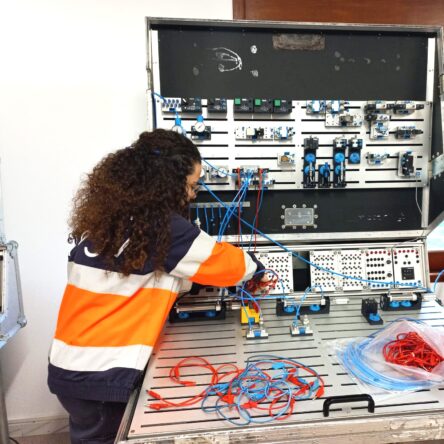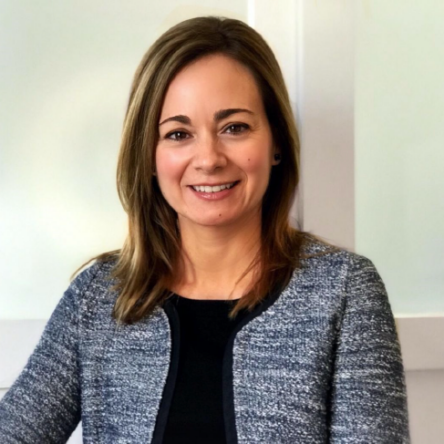
From intern to R&D&i team member: Discover Lidia’s story at Alier
At Alier, we encounter inspiring stories among our employees, from veterans who have dedicated half their lives to our company to young interns who are now official members of our team. Through these collaborators, we have grown and learned together. Lidia Aisa Puiggardeu is a shining example of this growth. She is deeply grateful to have been part of Alier and wishes to share her testimony with our team. We wish her every success in her professional career!
- Hello, Lidia, thank you for sharing your growth story at Alier. Could you tell us who Lidia is and what you do?
Hello! I’m Lidia Aisa, an industrial engineer with a master’s degree in Paper and Graphic Technology, and I’ve been part of the R&D team at Alier. I’m known for being a curious person, detail-oriented, and tenacious, qualities that have been essential in my journey so far.
- How did you come to know Alier and what motivated you to offer us your talent?
I discovered Alier through the ASPAPEL scholarships. When I decided to pursue my Master’s in Paper and Graphic Technology at ESEIAAT – UPC School of Industrial Engineering, I knew about the opportunity to apply for scholarships funded by companies in the paper industry. Alier caught my attention because of its support for students, prompting me to learn more. What truly motivated me was the strong commitment to environmental sustainability through the production of 100% recycled and recyclable paper.
- How was your development at Alier: Where did you start and how has your evolution been since then?
I started at the company as an intern in the Quality Department. There, I had to adapt my theoretical knowledge to industrial reality and delve into practical applications, where not everything is as perfect or precise as in books. After completing my internship and thesis, I moved to the R&D+i department. Here, I could apply much of what I learned in quality to build a solid foundation and take projects to the next level. Gradually, with the help of mentors and my coworkers, and through encountering various situations, I have evolved as a professional.
- How has Alier supported your career journey from starting as a student to becoming a member of the R&D+i team?
There comes a point in every student’s or professional’s life when you’re not quite sure which direction to take. After completing my engineering degree, I faced that decision. I’ve always been interested in materials and sustainability, and I’ve been curious about how things operate within the industry. Alier provided me with an incredible opportunity: they funded my master’s degree while I undertook a paid internship at the company, gaining industrial experience and completing a practical and applicable thesis. Moreover, after finishing my studies, Alier offered me the opportunity to stay and join the R&D+i department!
- What were your main functions in the R&D department?
My role, alongside the R&D+i team, allowed me to develop new products and explore opportunities for improvement that enable us to open markets and make advances in sustainability. As mentioned before, the commitment to sustainability and respect for the environment, being part of Alier’s 4 core values, are inspiring reasons to feel fascinated by your personal contribution to the team.
- As a young talent, what drew your attention to our sector?
The truth is, at first glance, this sector doesn’t seem very glamorous. However, it is developing rapidly. Normally, when we think of paper, we tend to think of the typical A4 printer paper, and that’s a product that might seem almost outdated now. On the other hand, if we consider the essential reduction in plastic consumption, the clear substitute in most cases is paper. Attempting to replace all this plastic with renewable and recyclable products is a significant challenge and requires a lot of research.
- Lidia, tell us about the honorary award you received in your master’s program. Congratulations! What do you consider to be the keys to your success?
To be honest, I was surprised and it was an honor for me. The truth is, I don’t have a magic formula for success, because if I did, I would never fail, and that’s not the case. What I can say is that when you do and study what you love, everything becomes much easier. I also want to acknowledge the work of the professors in the Celbiotech group, because as students, we can put in varying levels of effort, but good professors inspire you to always improve and go beyond.
- Lidia, to finish, what motivated you to become an engineer and who were your role models during your childhood? What message would you give to young women aspiring to become engineers?
I chose to study industrial engineering because I saw all the doors it could open for me. I’ve always been a curious person with a strong desire to learn, and when it came time to decide what to study, I thought that engineering is present in almost everything and would allow me to go as far as I wanted. Without a doubt, having role models who were engineers and scientists was important for me. Women like Gemma Roca Pallarès and Núria Salán, as well as my science and technology teachers in high school (all women, by the way), helped reaffirm my conviction that studying a technical career was possible and a good idea.
It’s important because we make up around 50% of the population, yet you don’t see such a proportion of female engineers in any field. How can we afford to disregard that amount of talent due to prejudice? The best solutions always come from diverse and plural teams, with varied perspectives and personal realities. To those young women, I would say that engineering is the engine of the future, and we all should have the opportunity and responsibility to contribute what we have to try to make the world better.




